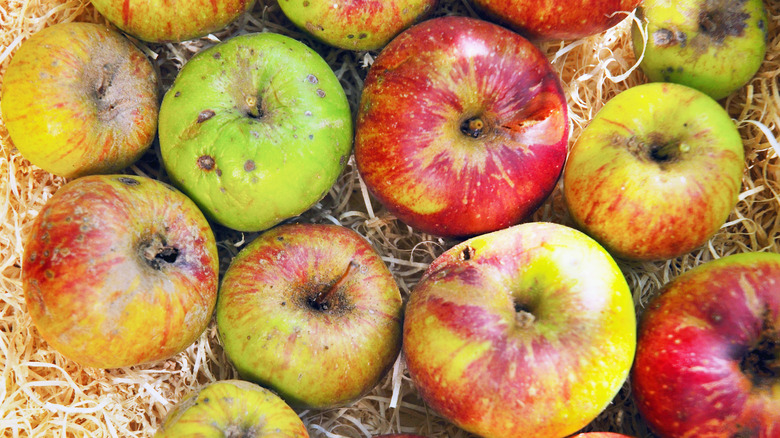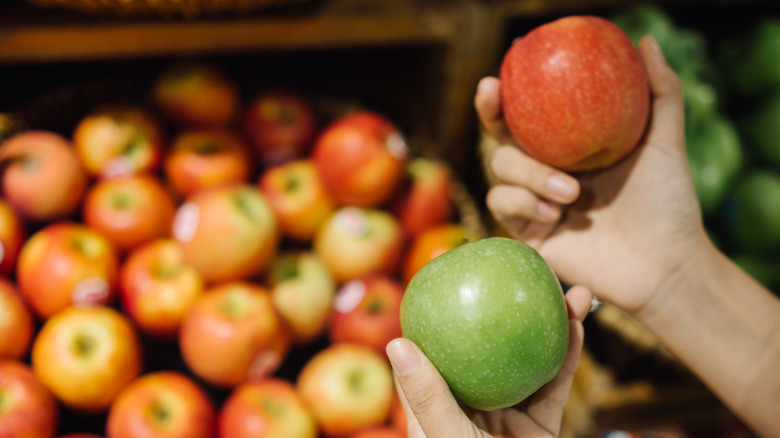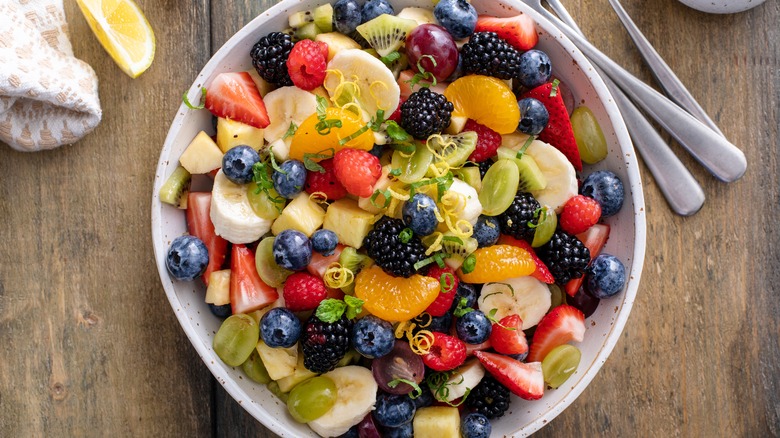How Bruised Apples Really Do Spoil The Bunch
It's been said countless times — "one rotten apple will spoil the whole bunch." While the classic adage serves as an important social metaphor, does it actually apply to the spoilage of the fruit itself? It turns out that this phrase is more than just a figure of speech. Even one sneaky bruised apple lurking in a bushel could spoil the entire batch.
The invisible source behind it all is ethylene, a natural gas and hormone produced in fruit cells that keeps maturation and ripening on schedule. It's usually harmless to the fruit — but when something like an apple is bruised, it opens the cell walls and allows excessive ethylene to escape into the air. Once airborne, the gas comes into contact with the skin of neighboring apples, prematurely browning that nearby fruit by halting the production of chlorophyll, the pigment that gives the fruit its vibrant color. It also converts the starches and fibers in the fruit's cell walls into sugars that break down the fruit's structure and create soft, mushy spots on the apple's skin.
It's not just apples, either; this phenomenon can happen to other fruits in your kitchen – poorly stored bananas, peaches, and other soft-skinned fruits are all vulnerable to the effects of ethylene. However, the effect isn't inherently harmful, and there are ways you can both prevent and camouflage bruises so you can continue enjoying your produce.
Best practices for avoiding apple bruising
Just like when you bump your arm and it turns purple, apples bruise when there is a hard impact, such as falling onto a tough surface. So, you'll want to delicately handle them when making your selection in the grocery store. Carefully scan the surface, looking for any discolorations or abrasions, ranging from large brown circular patches to small dark dots.
Make sure to feel for bruising, too — any soft spots or wrinkling may indicate an issue, even if the apple's color is still otherwise intact. Also, the apples at the top of the pile will be experiencing less compression overall and are likely in better condition. Therefore, don't dig down into the bottom of the bins; rather, stick to the apples stacked on the top.
Be careful handling your apples when commuting home from the grocery store, too, and consider using padding in your shopping bags to avoid extra pressure from the bumpy ride. Once you get home, store them in your fridge. Cool air will help to delay the ripening process by slowing down the release of ethylene. If you're cutting off a piece of the apple, and saving the rest, the remainder will brown and bruise over time due to enzymatic browning. To slow this down, eat the fruit sooner rather than later and squeeze fresh lemon on the apple's exposed flesh to inhibit the response that causes the ripening effect.
Rather than tossing that bruised apple, do this instead
Fruit bruising is a common occurrence. So, if you're regularly buying apples, you're going to inevitably run into this issue. Since it's perfectly fine to eat fruit with minor blemishes, you don't have to throw your imperfect produce away — there's plenty of uses and flavor left to enjoy. Instead, transform your fresh picks into a dish that relies on the sweetness of over-ripened fruit and will hide its brown appearance.
A macerated fruit salad is the perfect camouflage because it's easy to chop and blend the fruit in with the other ingredients. You can choose to add or omit the bruised bits based on the severity of the damage, but either way, the dish will taste great. The maceration process softens the fruit, drawing out its natural liquids and creating a syrup-like sauce, and it's easier than you'd think — simply sprinkle fruit with sugar and let it sit for a minimum of 30 minutes.
Other ways to transform your over-ripened apples include making an apple and chicken salad, applesauce, or a batch of hard cider if you're savvy with DIY beverages. However, an often overlooked solution is the simplest one — just eat that apple right away. The sooner you consume it, the fresher it will be, and you'll ensure that the one bad apple doesn't spoil the rest of your batch.



